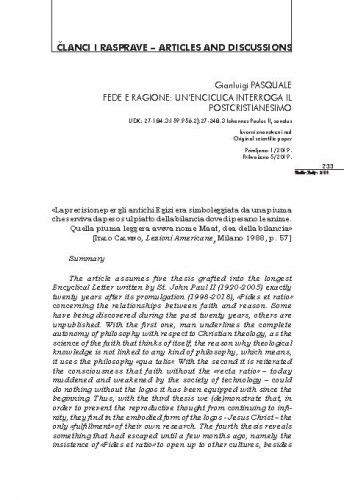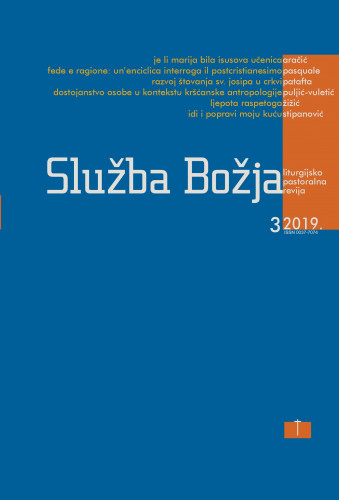L’articolo sviluppa cinque tesi innestate nella più lunga Lettera Enciclica scritta da San Giovanni Paolo II (1920-2005) esattamente a vent’anni dalla sua promulgazione (1998-2018), «Fides et ratio» inerente i rapporti intercorrenti tra fede e ragione. Alcune vennero intercettate durante il ventennio trascorso, altre sono inedite. Con la prima si ribadisce la completa autonomia della filosofia rispetto alla teologia cristiana, quale scienza della fede che pensa se stessa, motivo per il quale il sapere teologico non sposa nessun tipo di filosofia, ovvero la utilizza «qua talis». Con la seconda si ribadisce che la fede senza la «recta ratio» – oggi intorbidita e indebolita dalla società della tecnica – non potrebbe nulla senza il logos di cui si è attrezzata fin dall’inizio. Così, con la terza tesi si (di)mostra che, onde evitare che il pensiero riproducente se stesso prosegua all’infinito, essi trovi nella forma incarnata del logos – Gesù Cristo – l’unica «saturazione» del proprio ricercare. La quarta tesi rivela qualcosa che era sfuggito fino a qualche mese fa, ossia l’insistenza di «Fides et ratio» ad aprirsi ad altre culture, oltre a quella cristiana piuttosto secolarizzatasi, tipo quella indiana o asiatica, essendovi una «ratio». Con la quinta tesi, ugualmente inedita, si ravvisa che solo una «ragione etica» ovvero amicale, responsabile, fiduciale, appunto, può permettere alla fede di raggiungere quel livello rivelativo cui anela: nella persona di Gesù Cristo.; The article assumes five thesis grafted into the longest Encyclical Letter written by St. John Paul II (1920-2005) exactly twenty years after its promulgation (1998-2018), «Fides et ratio» concerning the relationships between faith and reason. Some have being discovered during the past twenty years, others are unpublished. With the first one, man underlines the complete autonomy of philosophy with respect to Christian theology, as the science of the faith that thinks of itself, the reason why theological knowledge is not linked to any kind of philosophy, which means, it uses the philosophy «qua talis». With the second it is reiterated the consciousness that faith without the «recta ratio» – today muddened and weakened by the society of technology – could do nothing without the logos it has been equipped with since the beginning. Thus, with the third thesis we (de)monstrate that, in order to prevent the reproductive thought from continuing to infinity, they find in the embodied form of the logos - Jesus Christ – the only «fulfillment» of their own research. The fourth thesis reveals something that had escaped until a few months ago, namely the insistence of «Fides et ratio» to open up to other cultures, besides the rather secularized Christian one, like the Indian or Asian one, there being a «ratio». With the fifth thesis , equally unpublished, it is recognized that only an «ethical reason» or amicable, responsible, fiducial, in fact, can allow the faith to reach that level of revelation which it longs for: in the person of Jesus Christ.
Sažetak

 Služba Božja : liturgijsko-pastoralna revija : 59,3(2019) / glavni i odgovorni urednik Ivan Macut.
Služba Božja : liturgijsko-pastoralna revija : 59,3(2019) / glavni i odgovorni urednik Ivan Macut.